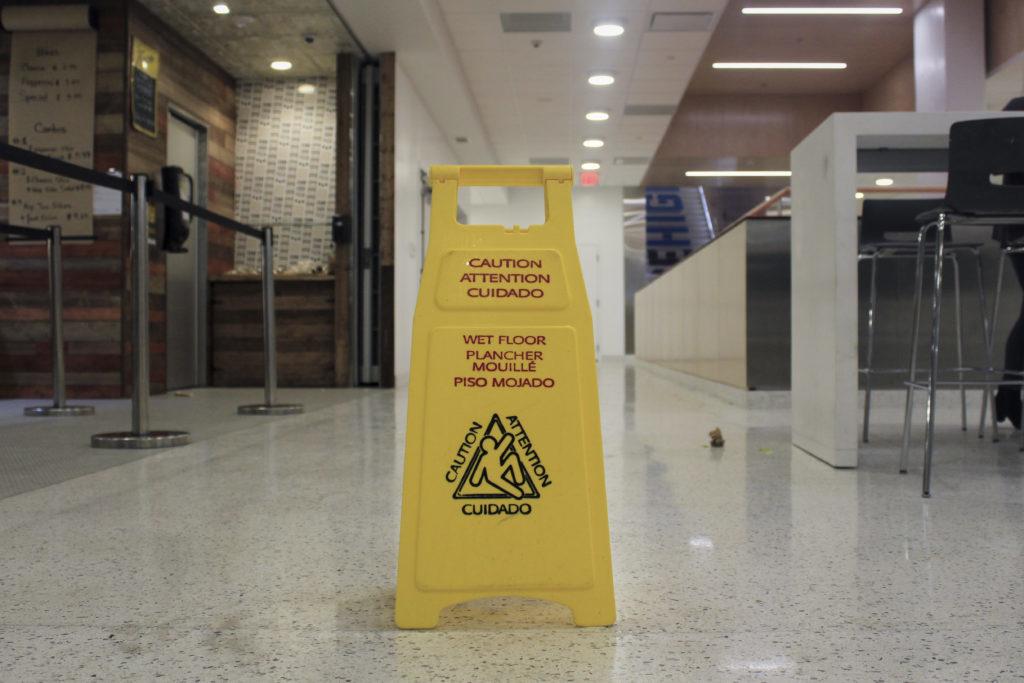A student organization is demanding GW offer better benefits to custodial workers.
Fair Jobs GW – a student-run campaign to push for better treatment of GW’s workers – met with officials last week to make demands for improved working conditions on behalf of janitorial workers. Members of the group said the workers are overworked and fear losing their jobs after officials have made staffing cuts and relied more heavily on third-party contractors in recent years.
Henry Klapper, an organizer for Fair Jobs GW and a former Hatchet reporter, said janitorial workers told members of the organization that the University is now understaffed and relies on contracted workers.
Aramark, a food and facilities company, has employed part of GW’s maintenance staff since at least 2004. Aramark representatives did not return a request for comment.
Klapper said that the University has not been replacing the workers who retire, leaving them understaffed and forcing remaining employees to take on tasks that were previously done by multiple people, causing confusion and stress.
He said the University has pressured current staff to retire early by hosting information sessions advertising early retirement and incentivizing retirement packages.
GW offered a buyout to maintenance workers in 2015 and officials at the time said it would help the University better manage staff.
Workers are being left in the dark. They are scared for the future of their employment.
“Workers are being left in the dark. They are scared for the future of their employment,” Klapper said. “We only see an interest to maximize profits or to focus on cutting down the bottom line, regardless of how it affects people who have been a part of GW for 34 years.”
Six Fair Jobs GW members delivered a letter to Alicia Knight, senior associate vice president for operations, last month requesting an official meeting to discuss improving the situation for workers.
After the letter was delivered, the students met with custodial workers, who he said were too fearful of losing their jobs to organize and attend the meeting themselves, to determine what demands they have, like needing more supplies and staff in each building.
Five of the group’s members met with Knight and John Ralls, the special adviser for communications and outreach in the Division of Operations, April 12 to discuss their concerns and press for solutions.
“The point was also to highlight and illustrate the concerns that many students have for these workers and to let management know that we are not going to stand by and take this,” Klapper said.
Klapper said officials at the meeting declined to discuss many of their specific concerns, including whether Aramark employees were replacing GW-hired workers and whether some University buildings were understaffed leaving maintenance employees overworked.
He said the officials made tangible commitments to more comprehensive resources for Spanish-speaking employees – like a bilingual newsletter – and vowed that there will be no layoffs or firings in the custodial department.
Knight confirmed in an email that the University does not plan to lay off any workers.
The University has stated repeatedly that there are no current intentions of eliminating the positions of existing housekeeping employees to outsource their jobs.
“The University has stated repeatedly that there are no current intentions of eliminating the positions of existing housekeeping employees to outsource their jobs,” Knight said.
Knight denied that janitorial workers were overworked and said officials consider how often and intensely buildings are used when deciding how many janitorial workers are assigned to clean a building.
“When the University has made changes in building assignments in recent years, it has not affected the employment status at the University of impacted workers and has not resulted in layoffs or terminations of existing GW staff, nor have staff members been forced to leave,” she said.
Knight declined to say how many contracted janitorial workers GW has on staff. She also declined to say whether contracted workers have different hours, job descriptions and wages than GW-hired staff and if officials have offered buyout packages to custodial workers since 2015.
Knight said GW has a “positive relationship” with its workers and that officials recently reached a new collective bargaining agreement with their union representatives, Service Employees International Union.
The University “will not provide specifics on items discussed” in the meeting with Fair Jobs GW, Knight said. She added that the meeting was positive and officials wanted the students to take part in events recognizing the contributions of workers.
“We appreciate the opportunity to engage in dialogue with students about areas of concern,” she said.





